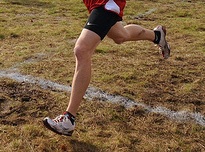 Gina Kolata is fast becoming my go-to girl for busting all the best-loved myths of running lore. A few weeks ago, she wrote a column calling the 10% rule into question (the upshot: we have no scientific evidence that it prevents injury; we as runners have just been repeating it back to one another for so long that we assume it must have some credible origin somewhere). A couple of days ago, she wrote about running surfaces, specifically whether running on softer surfaces prevents injury.
Gina Kolata is fast becoming my go-to girl for busting all the best-loved myths of running lore. A few weeks ago, she wrote a column calling the 10% rule into question (the upshot: we have no scientific evidence that it prevents injury; we as runners have just been repeating it back to one another for so long that we assume it must have some credible origin somewhere). A couple of days ago, she wrote about running surfaces, specifically whether running on softer surfaces prevents injury.If you've ever been treated for a running injury, you've probably heard this one from a doctor or physical therapist -- run on the track, run on dirt trails, run on grass; basically do whatever you can to avoid running on pavement. On the surface, it seems logical. A harder surface --> less give --> more force for your body to absorb --> higher risk of injury. But, as with the 10% rule, there doesn't seem to be much credible scientific evidence that this is true.
Her article begins with the story of Hirofumi Tanaka, an exercise physiologist at UT Austin who suffered a knee injury some time ago and was told by his orthopedist that in order to aid in his recovery he should avoid running on hard surfaces. Ironically, attempting to run on softer but less even surfaces resulted in his twisting an ankle and re-aggravating the knee injury.
As someone who worked with injured athletes, the whole episode got him interested in whether or not running on softer surfaces was actually likely to reduce the risk of injury. And as with the 10% rule, when he started looking for large-scale, well-controlled, peer-reviewed studies that looked at the question, he found that there were none. And in terms of anecdotal evidence (which, let's be careful to remember, is very different than scientific evidence), it seemed that runners may be just as likely to get injured on softer surfaces like grass and trails, because those surfaces are more likely to be irregular.
The two articles of Kolata's that I've read so far have really got me thinking about what other bits of ubiquitous running lore that "everybody knows" might actually have little or no basis in legitimate science, particularly since running on soft surfaces is advice I've gotten from both doctors and physical therapists for dealing with my shin splints. I remember reading in an article on running form a while back (which I haven't been able to hunt down) that there has actually been very little scientific research done on issues related to running (particularly running economy & injury prevention) because of the large scale that's needed to effectively investigate something affected by so many different variables & with so much variance in results. Because of that, the article went on, most of what doctors, PTs, coaches, trainers, etc. tell us is based on their personal experience with clients & patients. Now, that is absolutely NOT to say that that advice & experience isn't useful -- just that it's still anecdotal and not necessarily scientific.
Also, I very clearly have a HUGE back-log of Gina Kolata running articles to read. I had no idea the Times published so many! Keep 'em coming, Gina! :)
No comments:
Post a Comment